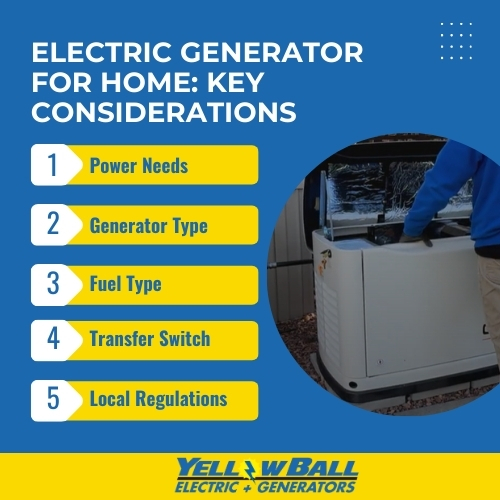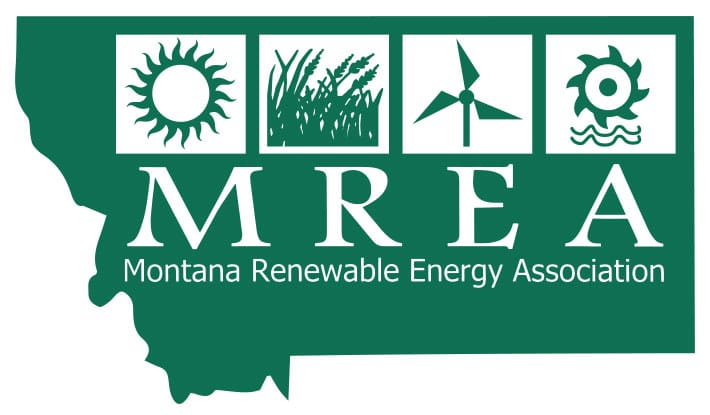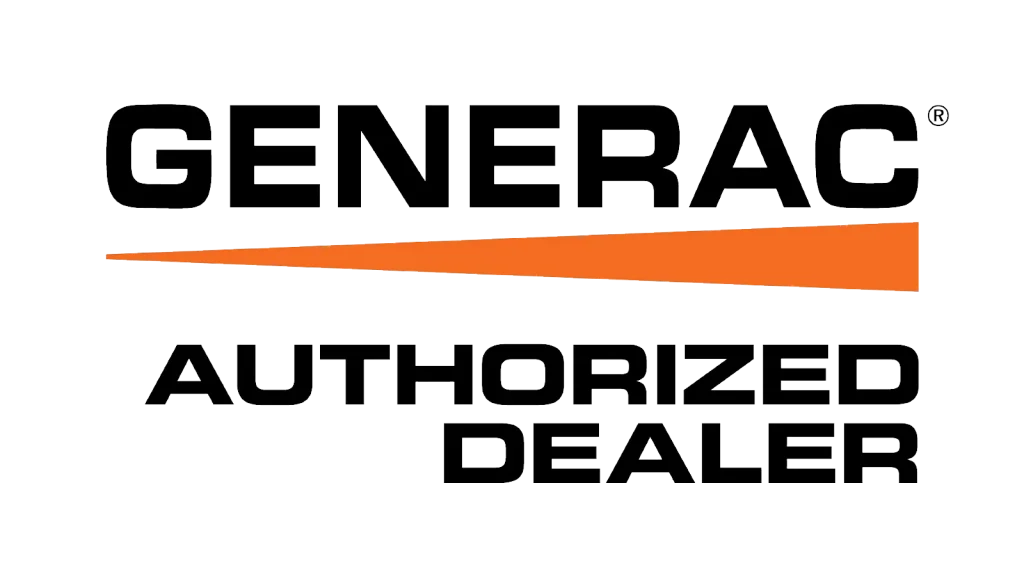A reliable electric generator for home use is a critical investment, especially with the increasing frequency of power outages. In Billings and Bozeman, unpredictable weather makes having a house generator even more important.
This comprehensive guide walks you through selecting the right electric generator for home, from sizing calculations to understanding different fuel types and transfer switch options. Let’s get started.
Looking for reliable backup power solutions? YellowBall Electric + Generators is here to guide you! Let us help you find the perfect electric generator for your home.
Choosing the Right Electric Generator for Home Use
Selecting an electric generator can seem complicated, but understanding the basics simplifies the process. Determining the appropriate generator size (measured in watts or kilowatts) is crucial for powering essential appliances.
Calculating Your Power Needs
A power calculator is essential for choosing the right home generator installation.
- Start by listing the appliances and devices you want to power during an outage, such as refrigerators, sump pumps, furnace fans, or water pumps.
- Determine each appliance’s starting and running wattage (usually on the appliance label). Remember, starting wattage is typically higher than running wattage.
- Add these amounts to calculate your total power needs.
Consider portable power stations for smaller needs.
Types of Electric Generators for Home Use
There are two main types of electric generators: standby generators and portable generators.
- A standby generator, also known as a whole-house generator, is permanently installed and automatically activates during power outages.
- A portable generator offers flexibility and can be moved as needed.
Both types provide flexibility depending on your setup and whether you need automatic backup or power for a few key items.
Portable inverter generators are popular for recreational use.
Using a portable unit for occasional power loss to run appliances like fans or microwaves can improve comfort until power returns.
A standby generator connected to medical necessities provides uninterrupted power, crucial for some individuals. Each type has pros and cons, so choose what best suits your needs.
For more information on what type of generator is right for you, contact YellowBall Electric + Generators!
Fuel Types
Electric generators use various fuels, including gasoline, propane (or liquid propane), natural gas, and diesel. Dual fuel generators support multiple fuel types, offering greater flexibility.
Consider tri-fuel portable generators if you have a natural gas line. Each fuel has cost and accessibility considerations.
Think about how power outages typically occur in your region when choosing a fuel generator.
Transfer Switches: Safeguarding Your Electric Generator for Home
Transfer switches are vital for safely connecting an electric generator for home use.
They’re important because they provide a safe separation from the power grid and prevent the dangers of using extension cords with larger generators.
Understanding Transfer Switches
Connecting a generator directly to an electrical outlet is dangerous and can have devastating consequences, endangering people and damaging the generator.
This happens when power surges, common during outages, overload the system. A properly installed transfer switch is essential.
Transfer switch installation and setup should be done by qualified professionals like YellowBall Electric + Generators.
A generator transfer switch can isolate circuits for added safety during an outage, and you can utilize an installer locator.
Manual vs. Automatic Transfer Switches
With manual transfer switches, you manually activate an exterior switch. This lets you connect extension cords from the generator to inlet boxes (professionally installed). Often, generators are permanently wired to the transfer switch.
Automatic transfer switches are common with permanently installed, higher KW generators. They disconnect from the grid and activate the generator automatically when the power goes out.
They restore power to the grid when service returns, requiring no intervention.
Electric Generator for Home: Key Considerations
Here’s a checklist of key factors for choosing an electric generator for home:
- Power Needs: Calculate required wattage by adding the starting and running wattages of essential appliances. Overestimate your needs to ensure your generator can handle the load.
- Generator Type: Choose between a standby generator for automatic backup or a portable electric generator for on-demand power. Consider the pros and cons of each type for your situation. Evaluate whether gasoline portable generator options are suitable for you.
- Fuel Type: Select a fuel source balancing cost, availability, and local regulations. Ensure the electric generator for home runs properly with your chosen fuel type.
- Transfer Switch: Invest in a transfer switch for grid separation. Prioritize an automatic model for ease of use or a manual one for safety with a portable unit. Make sure you check order status on time for your generator transfer switch.
- Local Regulations: Research local ordinances related to generator placement, noise levels, and carbon monoxide emissions. Be sure smoke detectors still function properly.
FAQs about Electric Generator for Home
What size generator is needed to power a house?
The required generator size depends on your simultaneous power needs during an outage.
Create a list of appliances, find their running/starting wattages, and add them up.
Factor in potential future additions when choosing a generator size. Utilize resources like a power calculator for guidance.
How long will 2 gallons of gas last in a generator?
A generator’s runtime on two gallons of gas depends on various factors. The electric generator’s type, capacity, load, and usage conditions all affect runtime.
Consult your owner’s manual for estimated runtimes based on different load levels.
Are electric generators worth it?
Generators provide invaluable peace of mind, especially in outage-prone areas.
Factor in noise levels and emissions for both your household and neighbors.
Your Guide to Choosing the Right Home Generator
An electric generator provides essential backup power, especially in areas like Billings and Bozeman, where weather can disrupt electricity.
The right electric generator offers peace of mind, letting you continue daily routines uninterrupted.
From assessing power needs and choosing between standby and portable generators to understanding fuel types and transfer switches, this guide empowers homeowners to make informed decisions.
Investing in a properly installed electric generator for home offers valuable security and preparedness. A safe and secure home is a well-prepared home. Stay safe and powered up.
Don’t wait for the next power outage! Contact YellowBall Electric + Generators today for expert advice and professional installation of your home generator.





